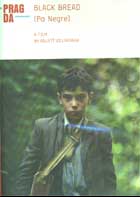
Black Bread 2011
Distributed by Pragda, 302 Bedford Ave., #136, Brooklyn, NY 11249
Directed by Agusti Villaronga
Directed by Agusti Villaronga
DVD , color, 108 min.
Jr. High - General Adult
Adolescence, Sociology, Women’s Studies, Storytelling, Film Studies, European Studies, Spanish Studies, Violence, War, Ethics, Philosophy, Economics
Date Entered: 07/18/2014
Reviewed by Jennifer Dean, Graduate of the CUNY Graduate Center MALS program with thesis on female filmmakers.Agusti Villaronga’s Black Bread explores the aftermath of the Catolonian Civil War through the eyes of a young boy, Andreu, after he witnesses the death of another young boy, Culet in the woods. Andreu’s father is accused of being responsible for Culet’s and Culet’s father’s death. His wife insists that the authorities are persecuting him purely for his politics (fighting against the fascists). Other than the opening scene of the film, the entire story unfolds through Andreu’s perspective. Scenes of fantasy are interspersed with reality and sometimes it is hard to distinguish what is in Andreu’s mind and what is actually happening. Promotional materials equate the film to Guillermo del Toro’s Pan’s Labyrinth but the fantasy sequences in Black Bread are much darker and less “fantastical.” Andreu’s imagination doesn’t lead him to a place of solace but to a much starker version of reality. Villaronga doesn’t allow the audience to escape, demanding that they face the fear of violence and recrimination just as Andreu does.
Black Bread is beautifully acted (including wonderful performances by all of the young actors in the film), well-shot (fantastic cinematography that manages to capture the darkness of the time, location and Andreu’s reality) and not only tells the story of this one intrigue and family but raises universal issues concerning class, gender and violence. All of the women in the family confront the limitations of their gender and struggle with being seen simply as sexual objects. A particularly revealing scene where Andreu’s mother goes to plead for clemency for his father reveals, through Andreu’s innocent attempts to find out what is going on as he peers into the office through the window, that she must endure sexual exploitation in exchange for some hope of helping her husband.
The film is also a coming of age story as Andreu engages in a flirtation with his cousin who has been a victim of the war in numerous ways (her father killed himself, her hand was blown off when she found a bomb as a child) and also must use her sexuality in order to survive. The school teacher seems to be the one person in her life who genuinely cares for her, but only in exchange for sexual favors. In the end Andreu must choose between his family and his future. He is offered financial security but only in exchange for being adopted by the woman who owns the house where his father’s family are caretakers. The film is multi-faceted and through the seemingly simple perspective of a child manages to tell an extremely complicated story very successfully.
Awards
- 9 Goya Awards and 13 Gaudi Awards